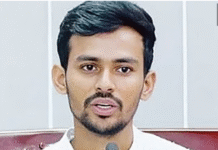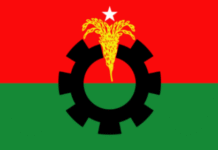Hefajat, a few Islamist groups instrumental in whipping up religious sentiment against AL-backed candidates
Intense campaigning by Hefajat-e Islam and some Islamist parties that used the religion card against Awami League-backed candidates was a key factor in the victory of BNP-supported contenders in Saturday’s polls in four city corporations.
The strategy saw so huge a success that the AL-backed candidates lost to their rivals by wide margins. It involved propaganda that the elections were a crucial race between believers and atheists. And, of course, as they put it to voters during their door-to-door campaign, the atheists belong to the AL camp.
They propagated the dubious idea that the government had killed several thousand Hefajat men on May 5 in the capital. The campaign, which began soon after Hefajat men were flushed out of the capital, intensified in the run-up to the city polls. The main opposition BNP termed it genocide. But their claims proved unfounded.
Hefajat men carried out the propaganda both overtly and covertly with the Election Commission failing to notice the violation of election rules. It exposed the EC’s inability to act against such violations.
A day after the elections, Hefajat issued a statement, claiming that its stance had been vindicated. The Islamist group made it clear that people had given their opinion against atheists in the elections.
With its morale lifted by the election results, Hefajat now threatens to hit the streets afresh to press for the implementation of the 13-point demand it had made public in April.
In Sylhet, Jamaat and Hefajat succeeded in drawing voters to their vigorous campaign against “atheists”.
Voters were made to believe that if they cast their ballots for the 18-party alliance-backed candidate, it would help the cause of Islam.
“But we could not run any counter campaign,” said Nizam Uddin, a city AL leader.
Ex-lawmaker Shahinur Pasha, also convener of Hefajat’s Sylhet city unit and joint secretary general of central Jamiat-e-Ulama-e-Islam, said, “We considered the election as a contest between believers and atheists, and ultimately the believers triumphed over the atheists.”
Pasha, an active campaigner for BNP-backed candidate Ariful Haque Chowdhury, said, “Kamran lost acceptability when he expressed solidarity with the Shahbagh activists.”
The situation was almost the same in Khulna. Two days before the election, activists of the BNP and religious groups were seen distributing leaflets that claimed the government had killed hundreds of Muslims at Shapla Chattar on May 5.
A number of Khulna residents said they were still confused about the May 5 incident, and many believed the government had done something wrong on that day.
“The government failed to clarify what happened on that night or launch an effective campaign to counter the propaganda,” said Sheikh Abdul Quayum, chairperson of Khulna Nagorik Forum, a citizens’ organisation.
In Barisal, BNP men portrayed AL-backed candidate Shawkat Hossain Hiron and his supporters as “drunkards” and questioned people whether they wanted to see a “real Muslim” as the city mayor.
Apart from Hefajat, supporters of religious figures like Charmonai Pir, Sharshina Pir and Quayes Pir worked against Hiron, and propagated from city mosques that Hiron neither went to mosques nor made any donations to them.
“It cannot happen that the government will kill our men and we will sit idle … We have taught the government a lesson,” said Mohammad Mobarak Ali, a supporter of Hefajat-e Islam in Barisal.
Their campaign left a profound impact on people’s minds.
The Daily Star yesterday talked to at least 50 people at different wards in Barisal, and most of them were made to believe that the government had killed many Hefajat men and hidden the bodies.
In Rajshahi, a half-hearted campaign for Liton could not match the aggressive electioneering for Bulbul by an allied force of BNP, Jamaat and religion-based parties that labelled the AL government as anti-Islamic.
“The action against Hefajat has been considered as an act against Islam. Jamaat and Hefajat activists used it to tweak the religious sentiments of people,” said a voter at Kadirganj.
Source: The Daily Star










BNP candidates have got 60% of the votes, AL candidates 40%. This the picture in 4 cities outside Dhaka. If Elections were held in Dhaka City Corp., AL will suffer sure defeat.
I am not sure if BNP has won for any positive reasons, but the defeat of AL can be attributed to several factors. Unlimited corruption in all spheres of statecraft involving many politicians, bureaucrats (high and low), police, judiciary, etc. is too big for the public to ignore. Surunjit, Inu, Hanif, MKA, Qamrul and Co have done significant damage to the AL cause. Unfortunately, the choice is not between which party is better than the other, but which is worse.
I notice that some AL people are blaming Hefazat for the success of BNP, but they do not say anything about the Shahbag fiasco. It was wrong for AL to get political dividends by playing the ‘pro-liberation’ card at Shahbag, which, in my opinion, has done quite the opposite. The narrative that AL represent all the pro-liberation forces and all anti-AL forces (including BNP) represent anti-liberation forces, is too simple and shallow.
In my opinion, Shahbag has produced the Hefazat phenomena and gone against the AL agenda. I have said it before, those who gathered at Shahbag, belong mostly to the urban middle class youths (beneficiary of the opportunities opened up by the creation of Pakistan and then Bangladesh). They do not represent the whole youths in our society. They may be dreamers, but divorced from reality. The fact is: The Madrasha students (or Talibans if you prefer) represent that vast number of our young people who are poor and have been totally ignored by the ‘progressive’ segment of our middle class Dhaka. Castigating them as fanatics, evil and terrorists does not help.
The state must find out the root causes of their so-called backwardness and treat them with some sympathy and dignity so that they can be integrated in the life of a modern state. Playing the ‘secular vs fundamentalist’ card is a dangerous game and we should avoid this.
Govt’s action and people’s reaction
How our govt treats the poor and religiously devoted class such as Hefajats- has been demonstrated by the brutal armed operation against those unarmed demonstrators on 5/6 May 2013.
Digonto TV and Islamic TV which were broadcasting live Prog of Shapla Square were shut down at dead of night, even their equipment was confiscated without valid documents. Hefajat rallies at different places including northern side of Baitul Mukarram Mosque were attacked by indiscriminate fire; pro govt cadres also attacked the supporters of Hefajats with fire arms, sharp objects and sticks who killed several Hefajat supporters. Even gun shots were fired aiming Baitul Mukarram Mosque itself showing total disrespect towards religious sanctity.
The assault launched on the sit in rally of few million Hefajat activists shutting the lights off. Media men were driven away. Still and video images show that hundreds of Police, RAB and BGB forces took up position surrounding the rally and started firing bullets, tear gas shells and used beating leaving deads and injured everywhere. Even unexploded grenades were seen on the road.
Video and still images show that deads are being lifted into trucks who has never been returned to their kins. Whole area has turned into a field of deads and the ground was covered by blood. Several video and hundreds of photoes are the evidence of what has been done to those unarmed citizens which is nicely termed by pro- govt propagandists as ‘Flashing Out’.
If the democratic govt considers such brutality as a legitimate and required action, the victims also deserve the right to show their reaction – not by same bullets but by ballots as seen in the recent city elections.
Govt has provided all out support, logistics, media coverage and protection to the Shahbagi hate preachers and allowed them to continue demonstration at Shahbag causing severe disturbance to the patients and public, they called for indiscriminate slaughtering and demanding death verdicts for all the defendants under trial by the controversial ICT. They were allowed to stay there for more than a month where as the govt did not tolerate only one night’s sit in procession of the Hefajats. Is it a democratic reaction by the govt ? If so, how do we condemn the massacre of 25th March 1971?
Massive corruption, repression on the opposition, suppression of media, selling of country’s interests to the neighbour and siding with the atheist hate preachers, govt has pushed the majority section of the population towards its opposition who clearly and loudly shown a Red Card to the ruling regime as a token of their non- confidence to this repressive regime.
After being rejected by the voters in almost all the major cities, this ruling regime has lost its legitimacy to rule the people anymore and the popular demand for reinstating the ‘non- partisan and neutral caretaker govt system’ has been voiced by the majority voters in all those cities which also represents the barometer of the non popularity of this govt throughout the country.
Now it is up to the govt – whether it will respect people’s democratic values and lives or flash out the opposition by remand and bullets. But it is the people who have the power to create a ray of light at the end of the tunnel.
Time is running out for the govt as the bell is already rung. Avoiding any disgraceful exit can still be avoided by reintroducing the non- partisan and neutral caretaker govt system and stopping further such bloodshed on own citizens.